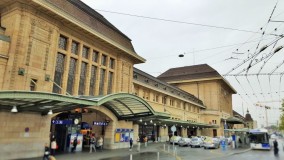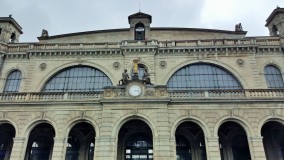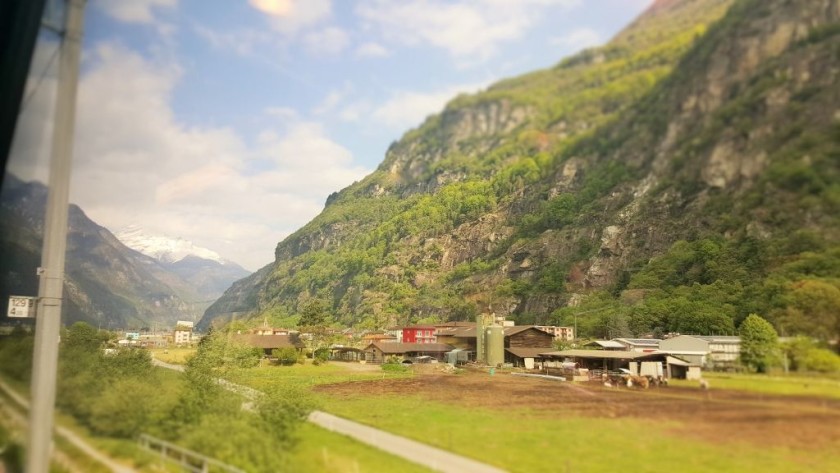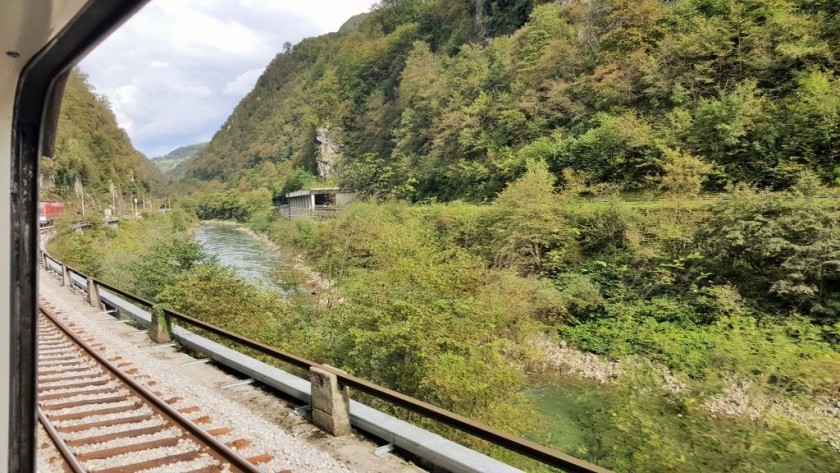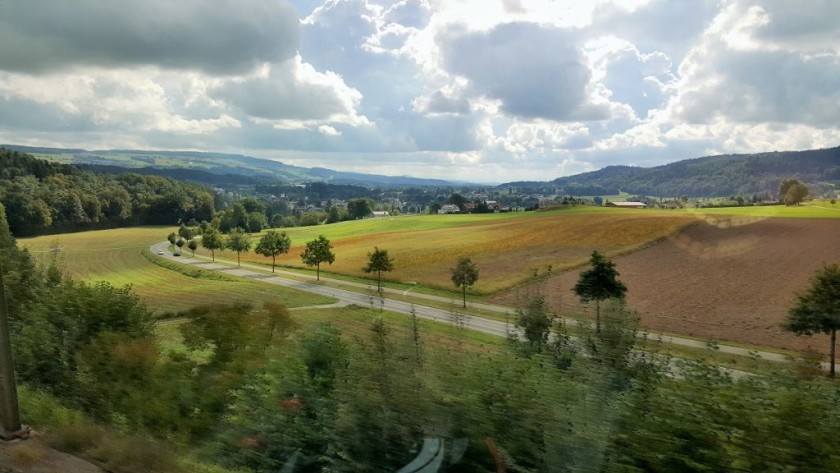Related Content
Content

Switzerland
Exploring Switzerland by train is inevitably fabulous with a plethora of incredible journeys to be experienced, so this guide provides all the essential info required for Swiss railway adventures!
Share
Helpful links:
Introducing Swiss train travel:
For a comparatively small country, Switzerland has a high number of quirky aspects to its rail system which can initially be bewildering, hence the info below.
Key to understanding the Swiss rail network is that it’s essentially a combination of TWO railway systems:
(1) Standard mainline trains that link its major towns and cities; most of which are operated by national rail operator SBB; with
BLS and SOB being the primary other mainline train operators in Switzerland.
However, even when mainline trains are operated by those other two companies, tickets can be booked on the SBB website, at SBB stations and from SBB ticket machines.
Therefore it doesn't particularly matter whether you will be travelling on a BLS train or SOB train, so we haven't singled them out.
So when ShowMeTheJourney references SBB tickets, the info also applies to journeys by BLS and SOB trains.
(2) The independent railways; including the lines which ascend up into the mountains.
SBB doesn’t serve some key destinations in Switzerland including the majority of ski resorts, instead these are served by the independent railways.
Hence the guide to to travelling to Swiss ski resorts by train .
Some of these independent companies operate extensive networks, while others just have one or two branch lines.
We have also published a guide to using these independent/private mountain railways; the info you can access includes links to each of these respective company's websites.
Temporary Covid 19 Alterations:
SBB, the Swiss national rail operator, has a Covid-19 travel advice and restrictions page, which is available here, (use Google Translate if need be).
Though particularly worth knowing is that face masks are mandatory on trains, but not in stations.
The restaurant service is also re-available on journeys within Switzerland.
International train service amendments:
The overwhelming majority of long-distance express day and train services to and from Switzerland have now resumed, including all scheduled services to Austria, Germany and Italy (though the planned, but yet to be operated new Zurich <> Bologna has yet to commence, but the new Zurich <> Genova service is available).
The Lyria high speed services between Switzerland and Paris will be operating to a reduced timetable until at least December 11th:
Paris <> Geneva = 6 x trains per day
Paris <> Zurich = 4 x trains per day
Paris <> Lausanne = 3 x trains per day.
Also only seats and couchettes and not the sleeping cabins are available on the Zurich <> Budapest 'Euronight' services.



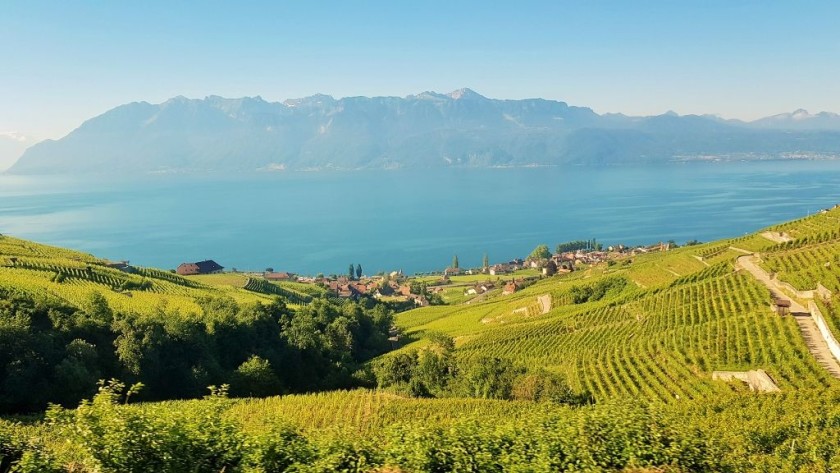
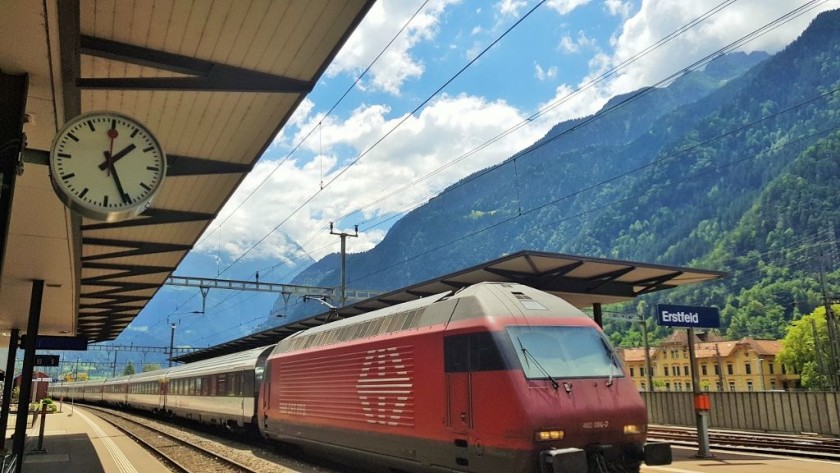



Travelling on SBB's trains:
SBB's express trains fall into two categories:
(1) The IC Train Services:
Aside from speed, the key distinguishing feature of these trains is that they convey restaurant cars.
Most IC train services are double-deck, but some are single deck; at busy times of the day additional single deck coaches can be attached to the double deck trains..
Brand new 'LD' double deck IC trains are now entering service on some routes.
The existing double deck trains are also beginning to show their age, hence it has been announced that they will be refurbished.
The tilting ICN trains are still in service, but are now also branded as IC services; they are also being refreshed.
(2) The IR train services:
Different types of services are designated IR (InterRegio).
On the Geneve – Sion – Brig route they are the fastest trains and are no different to the single and double deck IC trains; except for the fact that they don’t convey restaurant cars.
On some routes the IR services are slower than IC services, but the standard ticket price won't be any cheaper.
Some IR trains convey 1st class observation cars in which ordinary 1st class tickets are valid.
Also some IR services are operated by BLS or SOB,
The IC route numbers:
SBB has introduced route numbers for its IC and IR services - see the SBB IC/IR Trains route map in the links section above.
The IC train routes are now numbered as follows:
IC 1 = St Gallen - Winterthur - Zurich Flughafen (airport) - Zurich HB (main station) - Bern - Fribourg - Lausanne - Geneve - Aeroport
IC 2 = Zurich HB - Zug - Arth Goldau - Bellinzona - Lugano
IC 3 = Basel - Zurich HB - Landquart - Chur
IC 4 = Zurich HB - Schaffhausen
IC 5 = St Gallen - Winterthur - Zurich Flughafen - Zurich HB - Olten - Biel/Bienne - Neuchatel - Lausanne
and
Zurich HB - Olten - Biel/Bienne - Neuchatel - Geneve - Geneve Aeroport
IC 6 = Basel - Olten - Bern - Thun - Spiez - Visp - Brig
IC 8 = Romanshorn - Winterthur - Zurich Flughafen - Zurich HB - Olten - Bern - Thun - Spiez - Visp - Brig
IC 21 = Basel - Luzern - Arth Goldau - Bellinzona - Lugano
IC 51 = Basel - Delémont - Moutiers - Biel/Bienne
IC 61 = Basel - Olten - Bern - Thun - Spiez - Interlaken Ost - Interlaken West
the lack of Wi-Fi.
Swiss national rail operator SBB does not provide wi-fi on its trains in the conventional sense; meaning that passengers can't log on to a SBB portal for wi-fi.
Instead SBB has equipped its IC trains and most IR trains with signal amplifiers to enable enhanced connectivity with local mobile networks.
The coaches/cars equipped with this equipment have symbols by the doors - and SBB suggests that passengers who wish to access wi-fi during a journey, should travel in these coaches in order to access these 'hotspots'.
Also worth knowing
A yellow band above the doors indicates that a coach is 1st class.
For journeys within Switzerland, international trains have the same terms and conditions as Swiss trains.
Meaning that reservations aren't compulsory for journeys WITHIN Switzerland by Lyria trans, or on the EC trains which have travelled to and from Italy.
Passport checks can be carried out on board international trains to/from Switzerland.
Travellers are singled out apparently randomly, so don't be offended if the customs staff ask to see your passport, but ignore your fellow passengers.
Keep your passport in your hand luggage.
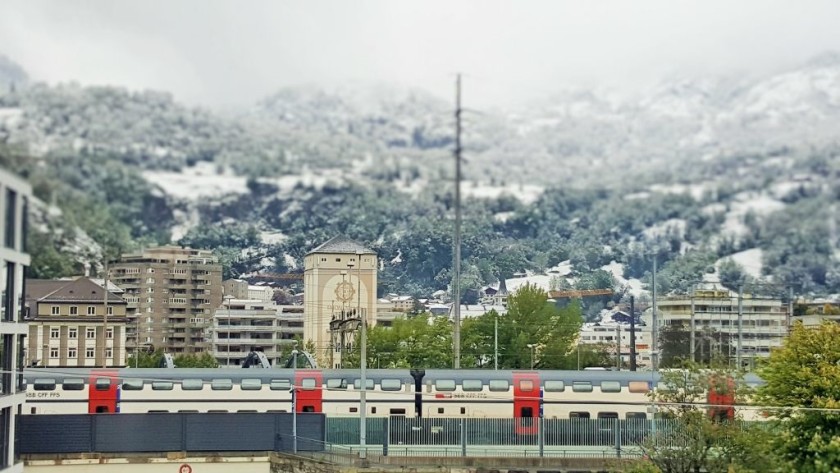



How the timetable works:
Trains usually operate to a regular ‘clock face’ timetable with hourly trains operating on most express train routes; though on some routes the service only operates every other hour.
So to facilitate an hourly service between destinations on some routes, in hours when there is no direct train service, connections between trains are built into the national timetable.
Connections between trains are designed so that the waiting time between trains across Switzerland is less than 10 minutes; and the private railways also usually follow this pattern.
Trains in Switzerland are VERY rarely more than 5 minutes late, so connections are usually guaranteed.
Though to ensure connections, trains can often spend up to 10 minutes waiting at stations and still depart on time.
International daytime trains to and from Switzerland also fit into this regular timetable, when travelling between destinations in Switzerland.
For example, some of the hourly trains between Basel and Interlaken are ICE trains, which have travelled from Germany, and not SBB’s regular IC trains.
The most scenic routes:
SMTJ has produced a guide to travelling on the most beautiful routes in Switzerland which we have been lucky enough to experience.
So (spoiler alert) they are:
- St Moritz <> Tirano
- Andermatt <> Disentis/Muster
- Grindelwald > Kleine Scheidegg > Lauterbrunnen
- Chur <> St Moritz
- Zug > Arth-Goldau > Goschenen > Airolo > Bellinzona
- Vitznau <> Rigi-Kulm
- Montreux <> Zweisimmen
- Brig > Kandersteg > Spiez
- Interlaken <> Luzern
- Martigny <> Vallorcine
- Lausanne <> Fribourg
- Thun > Spiez > Interlaken
- Zurich <> Chur
- Zurich <> Shaffhausen
- Visp <> Zermatt
Though despite multiple Swiss rail adventures, ShowMeTheJourney has yet to experience all of the best routes that can be taken by train in Switzerland, so in time it's likely that this will eventually become a Top 20 list of the country's Most Beautiful Train Journeys.
From what can be seen on YouTube and Instagram it's highly likely that the Brienz Rothorn Bahn and the GornegratBahn will merit an inclusion - and the route between Geneva and Visp is also rather fabulous!






Swiss train travel ideas:
How to see the best of Switzerland by train:
Swiss train travel info:
Make your Swiss train travel dreams a reality
Good to know about stations:
In Switzerland ticket inspections are carried out on the trains, so there is no need for stations to have barriers, or gate-lines.
As a result the stations are open to the surrounding streets with multiple access points, so you usually don't have to pass through station buildings in order to access the trains, or to transfer between buses and trains.
However, normally the short-cuts into the station can only be used if you already have a valid ticket.
If you need to buy a ticket look out for the ticket symbols on any signs that you see; the ticket desks and machines may not be in what looks like a main station building.
Often they're in the passage way beneath the tracks or are housed in the middle of a station.
Elevators and particularly escalators can be rare at Swiss stations - especially in the middle of the platform/track (gleis/voie).
Instead step free access is provided by slopes that connect the platform/track/gleis/voie to passage ways which are located beneath the railway tracks.
So if you have luggage etc there is always an alternative to using the stairs.
At most stations the platforms/tracks/gleis/voies are used by multiple train departures per hour.
So wait for your train where you can see the electronic displays which show the details of the next train to leave.
Also keep the departure time front of mind.
It's not unusual for SBB express trains to be timetabled so that they spend up to 10 mins at a station between arrival and departure.
So you often don't have to rush and board by the first door you see; even though most people do.
But if you use the time to move further along the train you can have a greater chance of finding spare seats etc .
Finding your train:




At Swiss stations the electronic departure screens, the paper timetable posters and the station announcements all normally DON'T include every station that a train will be calling at.
Sometimes only the next two or three stations that a train will be calling at are shown on the electronic indicators, along with the final destination of the train.
SBB also doesn’t use a system of train numbers on its information indicators or tickets, so being aware of the final destination of your train can help save time and confusion – hence we have striven to include it on our journey guides.
If you’re not sure what train you need to board check at the information desk or ticket office.
At the main stations there are electronic indicators on the platforms/tracks, which indicate in which zone of the platform the 1st class, 2nd class and restaurant car coaches will be located, when the train arrives.
They don't indicate in which zone a specific coach number will be located and they are also not particularly accurate - in our experience.
What they are particularly useful for is working out at which end of a train the 1st class coaches will be located.
If you will be changing trains at larger stations, seek out, what can be hard to find, paper departure posters that you can find on the platform.
They list all train departures in consecutive order so you can use then to check which platform/track/gleis/voie, your onward connection will be leaving from.
If you're in luck you'll be able to remain on the same platform you have just arrived at.
Storing and sending luggage:
The larger stations will have coin and card operated left luggage lockers, which can be accessed at any time.
When depositing bags you must pay for an initial 24 hours - even if you will be only depositing a bag for a couple of hours.
Then on collection you pay the balance - the charge will rise per day, but keep in mind that you may have pay in excess of 20 francs in coins, though lockers which accept cards are now being installed.
Change machines are usually available, though at the larger stations, with lockers in multiple locations, only one location can have a change machine
If you are going to be touring Switzerland then you can forward your luggage between stations, you don't have to take it on the trains.
This can be a particularly useful service if you will be entering and leaving Switzerland at different locations.
These luggage desks tend to be in a different part of a station to a left luggage office - it's easy to confuse the two.




Notes on the ticketing:
Buying tickets for Swiss train journeys is particularly quirky if you're not resident in Switzerland, so if you're new to Swiss train travel, we particularly recommend taking a look at our full guide below.
Amongst other things it explains how visitors to Switzerland can obtain Half Fare Cards.
Particularly worth knowing is that the SBB website sells tickets for rail journeys within Switzerland up to two months ahead of the travel date, so you can't book 3 - 6 months in advance for Swiss train journeys.
The journey prices on the SBB website:
For reasons, that are explained in detail on the full guide that can be accessed below, if you don't have a Swiss Half-Fare card, you can ignore the prices you will initially see when looking up tickets on the SBB (Swiss national railways) website.
The prices initially shown are always the Half Card rate, so if you don't have one, you won't be aware of the price you will actually pay until you have selected a specific ticket.
So if you will be using the timetable functionality on SBB, to compare prices of Swiss train journeys to buses/flights, you will need to take the first couple of steps of the booking process, in order to see the train ticket prices.
'Supersaver/Sparbilletter tickets:
Limited numbers of discounted 'Supersaver/Sparbilletter' tickets are now available on all of SBB’s express (IC and IR) train routes.
However, when searching for tickets, they MAY not be available on all departures, so you might have to search through the departures on a particular day to find them.
Whether 'Supersaver' tickets are available on a specific departure, is indicated on the SBB website by the presence of a % symbol on a black triangle.
These 'Supersaver/Sparbilletter' tickets can sell out fastest on the direct trains; so for some journeys these 'Supersaver/Sparbilletter' tickets are more likely to be available if you’re prepared to change trains.
Saver Day Passes:
If you will be making a long distance day return journey, purchasing a Saver Day Pass can often be a cheaper option than booking tickets for travel in each direction.
When looking up a journey on the SBB website, if the Saver Day Pass is cheaper, it will be offered as the default ticket option.
Though Saver Day Passes need to be booked at least a day ahead of your travel.
A plus of Saver Day Passes is that they also cover the fares on public transport to and from the stations.
Other tickets sold by SBB:
SBB's online booking system sells tickets for most journeys that involve a combination of SBB trains AND the trains of the independent operators.
In addition to Supersaver tickets, 'Point-to-Point' tickets are also available and in effect these are the standard, non-discounted tickets; so the price(s )you will see online for Point-to-Point tickets is also the price you will pay when booking last minute at the station.
The two key advantages of booking these more expensive tickets are:
- You can take any train on your travel date, so don't need to be concerned about making the specific departure you have booked
- They can be upgraded, for an additional cost, so that they are also valid on the public transport networks of the cities in which you will be starting and ending a journey.
Limited numbers of discounted tickets are also made available on all long distance express trains from and to Switzerland, so you can make savings if you book ahead, though SBB discontinued its long standing 'Swiss Transfer tickets at the close of 2018.
Booking Swiss rail tickets and passes:
Detailed guides to using tickets and rail passes:
Swiss Rail Travel News Highlights
SMTJ has selected articles likely to be of interest to a wide range of travellers,
International rail routes from Switzerland:
Thanks to its central European location, Switzerland is served by multiple international train services, and those from Austria and Italy also take rail routes that are among the most spectacular in all of Europe.
Some of Switzerland's international rail routes are also provided by its beautiful independent mountain railways.
It can be worth taking a detour to use them to depart from, or arrive in Switzerland; and if you will be travelling with a Eurail or InterRail pass, using them to access Switzerland can contribute to a pass being value for money.
to Austria:


The trains from Switzerland to Austria only take one of two routes.
Buchs > Feldkirch:
The three long-distance train services which travel this way are:
(1) The Railljet trains which operate every other hour on the Zurich – Sargans – Buchs* - Feldkirch – St Anton – Innsbruck – Salzburg – Linz – St Polten – Wien/Vienna route.
One of these trains has its journey extended beyond Wien to Budapest via Gyor.
Another of these Railjet trains has now had its journey extended to Bratislava.
*Buchs has trains from Chur, Landquart and St Gallen and a bus link with Leichtenstien.
(2) One EC train per day which takes a Zurich – Sargans – Buchs - Feldkirch – St Anton – Innsbruck - Kitzbuhel - Zell Am See - Graz route.
(3) The overnight trains on these four routes:
- Zurich – Sargans – Buchs – Graz
- Zurich – Sargans – Buchs – Villach - Jesenice – Lesce-Bled (for Lake Bled) – Ljubljana – Zidani Most – Dobova – Zagreb
(From June 13th to Sept 20th, it's possible to make connections in Zagreb for onward travel to Beograd/Belgrade, Sofia, Athens and Istanbul). - Zurich – Sargans – Buchs – Wien/Vienna – Gyor - Budapest
- Zurich - Praha/Prag
The only other trains which take this route are the local commuter trains, which shuttle across the border between Buchs and Feldkirch during the early mornings and late afternoons on Monday to Friday.
St Margrethen > Bregenz:
The only trains which makes this border crossing are the three daily EC trains on the Zurich - Zurich Flughafen/Airport -- St Gallen – St Margrethen* - Bregenz - Lindau - Munchen/Munich route.
*St Margrethen is served by trains which have travelled from Chur via Landquart.
to France:
The trains from Switzerland to France take one of six routes.
Geneva > Bellegarde:
These five train services all cross this border between Switzerland and France:
(1) Up to eight Lyria trains per day take this route; Geneve – Bellegarde – Paris (three trains per day on this route now commence the journey in Lausanne)
(2) The Lyria train on this route; Geneve – Bellegarde – Lyon – Avignon-TGV – Aix-en-Provence-TGV – Marseille will now only be departing between July 4th and August 30th.
(3) Up to ten TER trains per day travel from Geneve to Lyon via Bellegarde
(4) Infrequent local trains travel from Geneva as far as Bellgarde.
(5) Four TER trains per day take this route; Geneve – Bellegarde – Culoz - Aix-les-Bains - Chambery –Grenoble (two of these trains continue beyond Grenoble to Valence).
Geneve > Annemasse:
After a lengthy closure for rebuilding, this route has re-opened and new hourly Regional Express services link destinations on the north shore of Lake Geneva, including Montreux and Lausanne, to Annemasse in France.
In some hours connections are available in Annemasse to and from Evian Les-Bains or St-Gervais-Les-Bains - from where there are onward connections to Chamonix.
There are also hourly local trains from Geneve to Annecy which travel via Annemasse
In Geneve these train services now call all both at the main station, which previously hadn't been linked to Annemasse, and the re-opened Geneve-Eaux-Vives station.
Vallorbe > Frasne:
The only trains which come this way are the three Lyria trains per day that take a Lausanne - Vallorbe - Frasne – Dole – Dijon – Paris route.
Trains from Neuchatel via Pontarlier to Frasne connect into these trains.
The other trans from Lausanne to Paris now travel via Geneve - see above
via La Locle:
Three TER trains per day travel this way from La Chaux des Fonds to Besancon-Voite, the town centre station in Besancon.
There are trains to La Chaux des Fonds from Biel and Neuchatel.
These trains connect in Besancon into TGVs to Paris and there are also TER trains from Besancon to Belfort and Dijon.
Basel > St Louis, Haut Rhin:
These THREE train services all cross this border between Switzerland and France:
(1) Up to six Lyria trains per day take this route; Zurich – Basel – Mulhouse – Dijon* - Paris gare de Lyon
*Not all of these trains call at Dijon
(2) In most hours there are TER trains which take this route; Basel – Mulhouse – Colmar - Strasbourg
(3) There are also local trains from Basel to Mulhouse.
via Vallorcine (The Mont Blanc Express route):
Every hour during the day, trains operated by TMR depart Martigny for Vallorcine.
Martigny station is served by trains which depart at least hourly from Geneve, Brig, Lausanne, Montreux, Sion and Visp.
At Vallorcine connections are available into trains which travel on to St Gervais via Chamonix.
Some of these trains make connections in St Gervais with TER trains on to Annecy or Lyon.
to Germany (and on to The Netherlands):


The River Rhine and Lake Constance, also known as the Bodensee both provide natural barriers along the Swiss/German border, so there are only TWO routes used by long-distance express trains between Switzerland and Germany.
(The trains on the Zurich > Munchen/Munich route travel through Austria because the eastern end of the Bodensee is in Austria).
Basel SBB > Basel Bad Bahnhof:
Basel Bad Bahnhof is in Switzerland, but is managed as though it is a German station, so train services that only travel into Germany from this station have been excluded from this summary.
These train services below are those which travel between Basel SBB (the main station in Basel) and Basel Bad Bahnhof – when we include Basel on the routes, the trains call at both stations in the city.
The train services which travel this way include the ICE trains on these THREE routes:
(1) Interlaken - Spiez – Thun - Bern - Olten - Basel - Freiburg - Baden Baden - Kalrsruhe - Mannheim - Frankfurt (Main) - Kassel – Berlin (3 x trains per day from Interlaken)
(2) Zurich – Basel - Freiburg - Baden Baden - Kalrsruhe – Mannheim - Frankfurt (Main) -- Kassel Hannover - Hamburg (5 x trains per day)
Two of these trains commence their journey in Chur at 10:39 and 12:39 and travel to Zurich via Landquart.
The brand new ICE 4 trains now operate on this route.
(3) Basel - Freiburg – Kalrsruhe - Mannheim – Frankfurt Airport/Flughafen - Seigburg/Bonn - Koln/Cologne (- Wuppertal - Dortmund) (6 x trains per day).
One of the trains on this route has its journey extended to Dusseldorf – Duisburg- Oberhausen – Arnhem – Utrecht – Amsterdam.
This is the only direct train service, day or night, from Switzerland to The Netherlands.
The daily EC trains which also come this way are on these three routes:
(1) Interlaken - Bern - Basel – Freiburg - Karlsruhe - Mannheim - Koblenz – Bonn - Koln/Cologne - Dusseldorf - Dortmund - Bremen - Hamburg
(2) Zurich - Basel - Freiburg – Baden Baden - Karlsruhe - Mannheim - Koblenz - Koln/Cologne - Dusseldorf - Dortmund - Bremen - Hamburg
(3) Brig – Visp – Spiez – Thun – Bern - Olten - Basel - Freiburg – Baden Baden - Karlsruhe – Mannheim – Frankfurt (Main)
This train commences its journey in Milano.
Overnight Nightjet trains on these two routes also come this way:
(1) Zurich – Basel – Hannover - Hamburg
(2) Zurich – Basel – Magdeburg - Berlin
Schaffhausen > Singen:
Three train services make this border crossing;
(1) German IC trains on this route; Zurich – Schaffhausen – Singen - Rottweil – Horb – Stuttgart
(2) Swiss IC trains on a Zurich – Schaffhausen – Singen route (these trains connect in Singen with IC trains on Stuttgart)
The train service is arranged so that when travelling from Zurich to Stuttgart, in alternate hours there is a direct train, but in other hours a connection is required in Singen.
Sit on the right when travelling from Zurich for a spectacular view of the Schaffhausen Falls.
(3) German Regio trains on a Ulm – Frederichshafen – Radofzell - Singen – Schaffhausen – Waldshut – Basel (Bad Bahnhof) route.
to Italy:




he trains from Switzerland to Italy take one of four spectacular routes.
Brig > Domodossola (The Simplon Route):
These four train services all take this beautiful railway line from Switzerland to Italy;
(1) Four EC trains per day take this route:
Geneve - Lausanne - Montreux - Sion - Brig - Domodossola - Stresa - Milano
One of these trains continues its journey beyond Milano to Brescia - Peschiera del Garda - Verona – Vicenza - Padua/Padova – Venezia St Lucia.
(2) Three EC trains per day take this route:
Basel - Olten - Bern - Thun - Spiez *- Visp - Brig- Domodossola - Stresa - Milano.
*Trains from Interlaken make connections in Spiez.
Connect in Milano for cities to the south including Ancona, Bologna, Firenze/Florence, Genova, Napoli, Nice, Pisa, Rimini and Roma - none of these destinations have direct trains from Switzerland.
(3) One Swiss IC train per day, which departs from Basel at 10:26 and takes this route: Basel - Olten - Bern - Thun - Spiez - Visp - Brig - Domodossola.
(4) Up to seven x daily regional trains, on which rail pass users don't have to pay any reservation fees, are now USUALLY scheduled to depart from Bern to take the spectacular route via Kandersteg to Brig; and then travel on to Domodossola.
All of these regional trains also call at Speiz, where connections are available from Zwiesimmen and Interlaken.
via Chiasso (The Gotthard route)::
These train services all take this railway route from Switzerland to Italy;
(1) There are now up to 10 x EC trains per day which take a Zurich - Zug - Arth-Goldau* - Bellinzona - Lugano - Como - Milano route
*Trains from Basel via Luzern connect with these trains in Arth-Goldau/
One of these trains continues its journey beyond Milano to Brescia - Peschiera del Garda - Verona – Vicenza - Padua/Padova – Venezia St Lucia.
And another daily train now continues beyond Milano to arrive in Genova/Genoa.
Connect in Milano for cities to the south including Ancona, Bologna, Firenze/Florence, Genova, Napoli, Nice, Pisa, Rimini and Roma - none of these destinations have direct trains from Switzerland.
(2) One EC train* per day takes this route; Basel – Olten – Luzern - Arth-Goldau - Bellinzona - Lugano - Como – Milano
*This train commences its journey in Frankfurt (Main)
(3) Hourly regional trains now take this route: Locarno - Lugano - Chiasso - Como - Milano
(4) Hourly local trains take this route – Bellinzona – Lugano - Chiasso
Regionale trains to Milano Porta Garibaldi station connect with these trains in Chiasso.
via Camedo:

There are hourly ‘Centovali Express’ trains during the day, operated by F.A.R.T. which take this route from Locarno to Domodossola.
Locarno is served by trains from Bellinzona (which has frequent trains from Basel, Lugano, Luzern and Zurich) and in Domodossola connections are available to Milano, Stresa and Arona.
via Campocologno:
Up to 11 trains per day, which are operated by RhB, depart from St Moritz for Tirano for via Pontresina and Poschiavo.
Regionale trains link Tirano with Milano via the Lake Como towns of Colico and Lecco.
Easy connections are available in Pontresina from trains from Scuol-Tarasp, which have travelled via Samedan - and in Samedan another connection can be made from trains that have travelled from Chur.
So a journey by regular trains from Chur to Tirano involves two simple as can be connections.
Or as an alternative to the regular trains, you can travel direct from Chur to Tirano on the Bernina Express.
If you will be using a rail pass then travelling from Zurich to Milano on this route and making additional connections in Chur and Tirano, is the most spectacular means of taking a train from northern Switzerland to northern Italy.
Other sources of info:
The Swiss Travel System website is a great source of both practical info and inspirational articles.
Trains
































Cities
Basel / Bâle
Bellinzona
Rail Stations
Bern
Rail Stations
Brig / Brigue
Rail Stations
Chur
Rail Stations
Genève / Geneva
Rail Stations
Interlaken
Rail Stations
Lausanne
Rail Stations
Lugano
Rail Stations
Luzern / Lucerne
Rail Stations
Visp (for Saas-Fee and Saas Grund)
Rail Stations
Zürich / Zurich
Rail Stations
Journeys
# Jump to a cityBasel / Bâle
Journeys from Basel / Bâle
Jump to citiesBasel / Bâle to Bellinzona by train
Basel / Bâle to Berlin by train
Basel / Bâle to Bern by train
Basel / Bâle to Biel/Bienne by train
Basel / Bâle to Brig / Brigue by train
Basel / Bâle to Chur by train
Basel / Bâle to Davos by train
Basel / Bâle to Dijon by train
Basel / Bâle to Domodossola by train
Basel / Bâle to Engelberg by train
Basel / Bâle to Frankfurt by train
Basel / Bâle to Freiburg im Breisgau by train
Basel / Bâle to Grindelwald by train
Basel / Bâle to Hamburg by train
Basel / Bâle to Interlaken by train
Basel / Bâle to Kleine Scheidegg by train
Basel / Bâle to Klosters by train
Basel / Bâle to Köln / Cologne / Koeln by train
Basel / Bâle to Landquart by train
Basel / Bâle to Locarno by train
Basel / Bâle to London by train
Basel / Bâle to Lugano by train
Basel / Bâle to Luzern / Lucerne by train
Basel / Bâle to Milano / Milan / Mailand by train
Basel / Bâle to Mörel / Morel by train
Basel / Bâle to Mulhouse by train
Basel / Bâle to Paris by train
Basel / Bâle to St. Moritz by train
Basel / Bâle to Strasbourg by train
Basel / Bâle to Stresa by train
Basel / Bâle to Visp by train
Basel / Bâle to Wengen by train
Basel / Bâle to Zermatt by train
Basel / Bâle to Zürich / Zurich by train
Journeys to Basel / Bâle
Jump to citiesBerlin to Basel / Bâle by train
Frankfurt to Basel / Bâle by train
Genève / Geneva to Basel / Bâle by train
Hamburg to Basel / Bâle by train
Köln / Cologne / Koeln to Basel / Bâle by train
London to Basel / Bâle by train
Milano / Milan / Mailand to Basel / Bâle by train
Paris to Basel / Bâle by train
Zürich / Zurich to Basel / Bâle by train
Genève / Geneva
Journeys from Genève / Geneva
Jump to citiesGenève / Geneva to Andermatt by train
Genève / Geneva to Avignon by train
Genève / Geneva to Basel / Bâle by train
Genève / Geneva to Bern by train
Genève / Geneva to Bex by train
Genève / Geneva to Biel/Bienne by train
Genève / Geneva to Brig / Brigue by train
Genève / Geneva to Chur by train
Genève / Geneva to Grindelwald by train
Genève / Geneva to Gstaad by train
Genève / Geneva to Interlaken by train
Genève / Geneva to Lausanne by train
Genève / Geneva to Le Châble / Le Chable by train
Genève / Geneva to London by train
Genève / Geneva to Luzern / Lucerne by train
Genève / Geneva to Lyon by train
Genève / Geneva to Marseille by train
Genève / Geneva to Martigny by train
Genève / Geneva to Milano / Milan / Mailand by train
Genève / Geneva to Montreux by train
Genève / Geneva to Mörel / Morel by train
Genève / Geneva to Paris by train
Genève / Geneva to Sierre by train
Genève / Geneva to Venezia / Venice / Venedig by train
Genève / Geneva to Verona by train
Genève / Geneva to Visp by train
Genève / Geneva to Wengen by train
Genève / Geneva to Zermatt by train
Genève / Geneva to Zürich / Zurich by train
Journeys to Genève / Geneva
Jump to citiesLondon to Genève / Geneva by train
Lyon to Genève / Geneva by train
Marseille to Genève / Geneva by train
Milano / Milan / Mailand to Genève / Geneva by train
Paris to Genève / Geneva by train
Venezia / Venice / Venedig to Genève / Geneva by train
Verona to Genève / Geneva by train
Zürich / Zurich to Genève / Geneva by train
Zürich / Zurich
Journeys from Zürich / Zurich
Jump to citiesZürich / Zurich to Arosa by train
Zürich / Zurich to Basel / Bâle by train
Zürich / Zurich to Bellinzona by train
Zürich / Zurich to Berlin by train
Zürich / Zurich to Bern by train
Zürich / Zurich to Biel/Bienne by train
Zürich / Zurich to Bratislava by train
Zürich / Zurich to Brig / Brigue by train
Zürich / Zurich to Budapest by train
Zürich / Zurich to Chur by train
Zürich / Zurich to Davos by train
Zürich / Zurich to Disentis/Mustér by train
Zürich / Zurich to Engelberg by train
Zürich / Zurich to Frankfurt by train
Zürich / Zurich to Freiburg im Breisgau by train
Zürich / Zurich to Frutigen by train
Zürich / Zurich to Genève / Geneva by train
Zürich / Zurich to Graz by train
Zürich / Zurich to Grindelwald by train
Zürich / Zurich to Hamburg by train
Zürich / Zurich to Innsbruck by train
Zürich / Zurich to Interlaken by train
Zürich / Zurich to Klosters by train
Zürich / Zurich to Koblenz by train
Zürich / Zurich to Köln / Cologne / Koeln by train
Zürich / Zurich to Landquart by train
Zürich / Zurich to Lausanne by train
Zürich / Zurich to Linz by train
Zürich / Zurich to Locarno by train
Zürich / Zurich to London by train
Zürich / Zurich to Lugano by train
Zürich / Zurich to Luzern / Lucerne by train
Zürich / Zurich to Milano / Milan / Mailand by train
Zürich / Zurich to Mörel / Morel by train
Zürich / Zurich to München / Munich by train
Zürich / Zurich to Neuchâtel / Neuchatel by train
Zürich / Zurich to Paris by train
Zürich / Zurich to Praha / Prague / Prag by train
Zürich / Zurich to Salzburg by train
Zürich / Zurich to Schaffhausen by train
Zürich / Zurich to St. Anton by train
Zürich / Zurich to St. Moritz by train
Zürich / Zurich to Stuttgart by train
Zürich / Zurich to Venezia / Venice / Venedig by train
Zürich / Zurich to Verona by train
Zürich / Zurich to Visp by train
Zürich / Zurich to Wengen by train
Zürich / Zurich to Wien / Vienna by train
Zürich / Zurich to Zagreb by train
Zürich / Zurich to Zermatt by train
Journeys to Zürich / Zurich
Jump to citiesBasel / Bâle to Zürich / Zurich by train
Berlin to Zürich / Zurich by train
Budapest to Zürich / Zurich by train
Frankfurt to Zürich / Zurich by train
Genève / Geneva to Zürich / Zurich by train
Hamburg to Zürich / Zurich by train
Innsbruck to Zürich / Zurich by train
Köln / Cologne / Koeln to Zürich / Zurich by train
London to Zürich / Zurich by train
Milano / Milan / Mailand to Zürich / Zurich by train
München / Munich to Zürich / Zurich by train
Paris to Zürich / Zurich by train
Salzburg to Zürich / Zurich by train
Venezia / Venice / Venedig to Zürich / Zurich by train
Verona to Zürich / Zurich by train
Wien / Vienna to Zürich / Zurich by train
See if there’s a unique journey guide for your trip, featuring info on the trains, tickets & stations.

This is one of more than 150 train guides available on ShowMeTheJourney, which will make it easier to take the train journeys you want or need to make. As always, all images were captured on trips taken by ShowMeTheJourney.



















